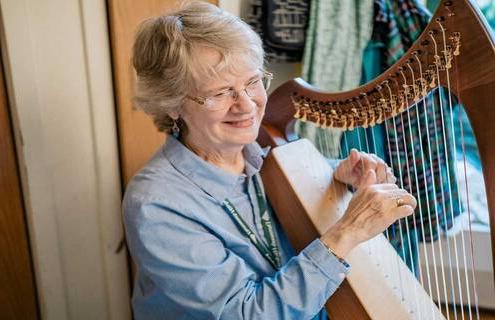
“Soothing” is the word most often used to describe Margaret 史蒂芬斯’ harp music. You also hear “relaxing,” “beautiful,” and “lovely.”
史蒂芬斯, a certified therapeutic harp practitioner, has been playing her harp at Dartmouth 健康 for patients and their families as well as staff for the last 19 years. Three days a week, she travels between the Dartmouth Cancer Center, the Dartmouth Hitchcock Medical Center, and the Jack Byrne Center for Palliative & Hospice Care (JBC).
我们的目标, 史蒂芬斯 says, is to “create a space of relaxation, a 分散注意力 from inner and outer concerns, a sense of safety, and to ease anxiety.” She calls what she provides “a cradle of sound.” The form it takes is determined by talking with the patients to get a sense of what they like and what they may need for their situation.
“I also observe responses and try to intuit the musical directions that are needed,她说。.
The vibrations from harp music can not only be heard but also felt. So 史蒂芬斯 uses a small, 平, 23-string Reverie harp at DHMC “to transmit soothing tones by placing it on a patient’s back, 手臂, 肚子, wherever it is appropriate.” At the JBC, she uses their Vibroacoustic chair, which can be connected to her harp through an amplifier.
“Family members can sit in the chair and feel the vibrations of the low harp tones in many parts of their body,她说。. “It is a musical massage, and it can offer many wonderful effects.”
The list of effects 史蒂芬斯 has witnessed is long: relaxation, 睡眠, emotional release, communication, lower blood pressure, 分散注意力, connection to memories, spiritual support, 快乐, mood enhancement, and sometimes pain reduction. She says scientific studies back up the positive effects of live harp music.
And the benefits are not just for patients and their families. “I also try to offer a ‘musical respite’ to staff members whenever I can,” 史蒂芬斯 says. “This can be part of Tea for the Soul, which is provided by chaplaincy, or just offering music in the hall near the nurses' station. I play once a week in the NICU, which is an open space, so the staff can en快乐 it.”
The harp music is offered free of charge through the Complementary Care Program, made possible by Prouty and other philanthropic supporters through the Friends of Dartmouth Cancer Center. Recently, the program was expanded to Nashua and Manchester, NH, and St. Johnsbury, VT, with Pamela Stohrer in NH and Patricia Williams in Vermont. Both are Certified Therapeutic Harp Practitioners.
“I’m thrilled that more patients and families are having access to this type of therapy,” 史蒂芬斯 says.
This article was first published under the title of "Healing Harp" in the February 2024 issue of 连接ions Magazine.